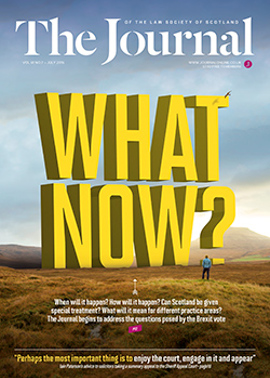Socially motivated

One of the difficult areas of law to find a traineeship in is the broad field of social welfare – hardly surprising, given the lack of public funds and the limited means of organisations working there. But a funder has recently arrived with the means to support some places, and the ambition to attract partnership funding to help it expand its operations.
The Justice First Fellowship is the brainchild of the Legal Education Foundation charity (LEF). Formerly known as the College of Law, in 2012 it sold the education and training business that continues under that name, changed its own name and used the healthy £200 million sale proceeds to set up an endowment, the income from which now supports 18 trainees across the UK, all committed to social justice-related work.
Scotland has benefited. Deirdre Flanigan, a trainee at Govan Law Centre (GLC), was among the first “fellows” appointed, from January 2015; this year Glasgow’s Legal Services Agency also won funding, and Clan Childlaw has successfully applied for 2017. But LEF considers any potential outlets that meet the criteria – currently including two private legal firms in England.
What they receive is not only the fellow’s salary, but training costs (including TCPD), a laptop and a supplement to cover supervision. The investment aims to enable the fellow to contribute to their future sustainability, also an important benefit to funded employers: additional training is part of the package, involving two or three trips a year to London to learn from experts in communication and applying for funding. That too adds an extra dimension to what a trainee might expect to learn.
Funding decisions for the following calendar year are made by the summer, with the 2017 round having just been decided; but trainees for next year’s funded places have still to be chosen. There is a central application system, but each organisation vets the candidates that have applied to work for it, with LEF taking only an observer role.
Key projects
A commitment required of fellows is that they develop a project during the fellowship, that will advance access to justice in some way. For Flanigan, previously with the Scottish Human Rights Commission, this involves preparing a report for the UN Committee on Economic & Social Rights as it periodically considers the UK’s performance, using case studies arising from GLC’s public interest litigation unit which she helped set up along with principal solicitor Mike Dailly. Farida Elfallah, LSA’s funded trainee, is working on a research-based project, focusing on identifying routes to safety for migrant women affected by violence, particularly those with no recourse to public funds. In each case the hope is that the project will become sufficiently established to attract further funding. “You start creating your own job,” as Flanigan puts it. “You are encouraged to find the funding to go on.”
Still in her first year, Elfallah has been to London twice with the fellowship, “where I have obtained in-depth training from the best in the industry on media, communications, the importance of IT, and project development as well as developing a better understanding of how to improve access to justice in social welfare law”.
Their employers are wholly enthusiastic about the scheme. “It’s been a huge benefit to ourselves,” GLC’s Candy Walker affirms. “I’m down in London with the trainees; it gives a real idea about funding and finances that trainees don’t normally get a handle on. And it’s very interesting to meet other funded organisations in England and Northern Ireland.”
LSA’s Kirsty Thomson agrees. “I cannot recommend the fellowship highly enough to both students, as possible fellows, but from my perspective to employers – future hosts of the scheme. I cannot emphasis enough what a fantastic opportunity it is for the host as well as the fellow. Yes, the focus is on the fellow, but JFF gives the hosts all the tools and support required to facilitate that.”
She adds one word of caution: “A host will be chosen for its ability to be part of this wider movement and to invest in the skillset needed. The project is an important part of that and hosts need to be prepared to put that investment in place, including support for the project.”
Partners please
Publicising the fellowship is not just a way to increase the queue of hopeful applicants – LEF is also keen to go into partnership with other foundations, and organisations such as banks (RBS co-funds Irzum Mahmood, GLC’s second fellow), to expand its funding capability.
It is having some success. Round 3 of the scheme will provide places for 13 fellows: two barristers from October 2016 and 11 trainee solicitors from January 2017. Natalie Byrom, LEF’s director of research and learning, confirms: “We hope to achieve similar numbers in round 4, but this is heavily dependent on our ability to attract co-funders.”
In this issue
- Environmental law outside the EU
- 2014 revisited: championing Scotland in the EU
- “Justice for sale”
- After the fling
- Traps for the unwary
- Reading for pleasure
- Opinion: Rory Scothorne
- Book reviews
- Profile
- President's column
- Leading by example
- People on the move
- Brexit: a full menu
- Appeal of the new court
- Hostility enacted
- Socially motivated
- Back on the case?
- Send the client in?
- What does Brexit mean for planning and environmental law?
- Immigration meets licensing: not a marriage made in heaven
- Post-Brexit taxation: less of a certainty?
- Scottish Solicitors' Discipline Tribunal
- Community right and commercial sale
- Plane language
- Law reform roundup
- SSDT has a new clerk
- Covered by the terms?
- Ask Ash
- To boldly go...
- Hacking into the law
- Paralegal pointers






